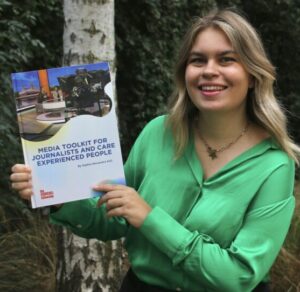
2023 Fellow and recent Senior Fellow, Sophia Alexandra Hall, writes about a toolkit she’s just released, which can be downloaded here.
When I first qualified as a journalist, a number of my friends began reaching out to me for advice.
Not on becoming a journalist themselves, or to get me to write an article about them. But to help them navigate a media interview gone wrong.
I’m Sophia and I’m the deputy digital editor at the Big Issue. I’m also a former John Schofield Trust fellow turned senior fellow and, perhaps most importantly, a care experienced person.
Being care experienced means I spent part of my childhood in the UK’s foster care system.
Despite a very lonely few teenage years spent feeling like I was the only person in the world to experience the highs and lows of the care system, thanks to the wonderful world of social media, I connected with many care experienced adults online in my early 20s with similar experiences to my own. Many of these connections I now consider close friends.
So when I gained my gold-standard NCTJ from News Associates during the pandemic and began my first full-time career in the media industry, I began hearing the same problem from my friends over and over again.
“A journalist tricked me into sharing more than I was comfortable with. And now that article’s on the internet forever!”
“I didn’t realise this newspaper was going to publish multiple pieces about me and my life story. I only agreed to do one on a specific topic.”
“They spelled my name wrong and said I grew up in a care home when I was actually in foster care. It hurts that they got these details wrong.”
I heard multiple horror stories from my friends of journalists digging into the most traumatic aspects of their lives, just to write a juicy headline. I offered advice where I could, but I wanted to provide my friends with some real trauma-informed support they could easily access when I wasn’t available.
In 2021, I came up with the idea of a media toolkit. An easily accessible document any care experienced person could find for free to help them prep for a media interview. I wanted it to detail questions to ask before, during and after an interview, a checklist to help figure out if you were ‘ready’ to speak to a journalist, and advice on how to protect your life story when sharing your experiences in the media.
As both a care experienced person and a media professional, I also wanted to dedicate part of the toolkit to journalists, to help them prepare for an interview with someone from my community.
I’m pleased to say after three years of research, my Media Toolkit for Journalists and Care Experienced People has now been published and is available for download. The toolkit wouldn’t have been possible without the support of the Churchill Fellowship who funded me to travel to America for a month earlier this year to speak to over 50 journalists, care experienced people, psychiatrists, social workers, and trauma specialists.
Whilst the toolkit is directed at care experienced people and journalists working with them, the advice stems far beyond just this community.
The suggestions and support within the toolkit’s 36 pages can truthfully be applied to any interviewee who has experienced trauma. In the toolkit I refer to ‘disempowered people’, which I define as an interviewee who has experienced a traumatic event where their choice was taken away. This could be due to nonconsensual acts, such as sexual assault, or being a child in the foster care system, where they had no say in where they were being sent to live next.
So far, this toolkit has made its way into many of the major newsrooms, including Channel 4, ITV and the BBC. It has also been sent to CEOs of major charities including Barnardos, the Fostering Network, Become and Coram.
For three years I worked on this project alongside a full time job in the industry. I truly hope this toolkit is able to make a positive change in journalism for both media professionals and our interviewees.
If you’d like to learn more about the toolkit you can find me on @sophiassocials across every social media platform. And with National Care Leaver Week fast approaching in October 2024, I am also offering newsroom and charity media trainings to help both journalists and care experienced people prepare for media interviews.
